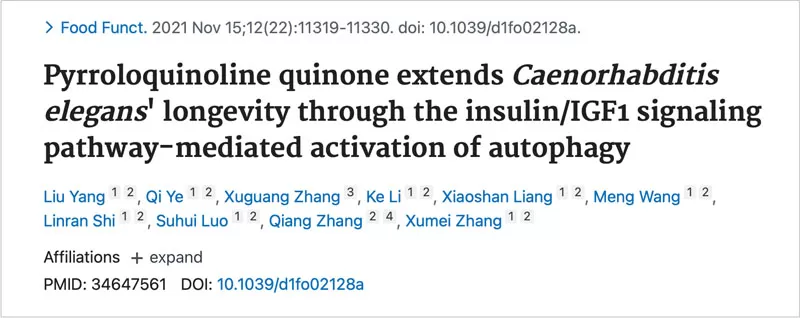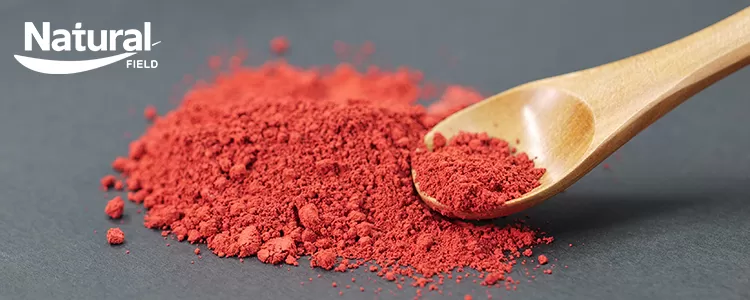Tianjin Medical University Study In 2021, a research team from Tianjin Medical University published a study showing that PQQ (Pyrroloquinoline Quinone) extended the average lifespan of Caenorhabditis elegans by up to 33.1%. The study also found that PQQ improved the worms’ mobility and stress resistance, while reducing fat accumulation and reactive oxygen species (ROS) levels. With the release of this impressive data, PQQ’s status as an anti-aging star has been further solidified.

PQQ, short for Pyrroloquinoline Quinone, is a novel cofactor with various bioactive properties that are highly beneficial to human health. Research on PQQ dates back to the 1950s when it was discovered in microbial metabolism. However, it wasn’t until 1979 that PQQ was first isolated and its structure and name were determined.
As research has progressed, PQQ has gradually become a highly regarded nutrient and anti-aging star. PQQ has earned numerous titles, such as “Longevity Vitamin,” “Neuroprotective Agent,” “Mitochondrial Optimizer,” “Cardiovascular Guardian,” “Antioxidant Master,” and “Immune Modulator.” Bruce Ames, a prominent figure in the field of anti-aging research, a member of the National Academy of Sciences, and a professor at the University of California, Berkeley, introduced the concept of “Longevity Vitamins,” with PQQ being one of them.

Bruce Ames
As a “Longevity Vitamin,” PQQ is an essential substance for the health of mitochondria, the “powerhouses” of cells. It plays a crucial role in cellular energy metabolism, antioxidant defense, anti-inflammatory functions, and neuroprotection.
PQQ has a very good safety profile. Its natural source is microorganisms found in soil, which can be absorbed by plants and then enter animals through the food chain. Therefore, PQQ naturally exists in various foods such as milk, eggs, and spinach. PQQ is also widely present in human tissues, with particularly high levels found in breast milk. PQQ is commonly used in dietary supplements in the form of disodium salt (Pyrroloquinoline Quinone Disodium Salt), and its safety has been widely recognized.
The U.S. Food and Drug Administration (FDA) has designated PQQ as GRAS (Generally Recognized As Safe).
The European Food Safety Authority (EFSA) has recognized the safety of PQQ as a novel food.
Health Canada has included PQQ in its Natural Health Products Ingredients Database.
In China, the National Health Commission issued Announcement No. 1 of 2022, approving PQQ as a new food ingredient after passing a safety evaluation review.
Regarding consumption, the typical recommended dosage is ≤20 mg/day. Infants, pregnant women, and breastfeeding women are advised not to consume PQQ.
The newly published 2024 study, “The Effects and Potential Benefits of PQQ on Human Health,” explores the roles of PQQ in anti-aging, cardiovascular health, neuroprotection, cognitive health, weight management, sleep improvement, blood sugar regulation, and anti-tumor activities. Further research has also found that PQQ excels in areas such as growth and development, bone health, gut microbiota, immune function, and skin health.
PQQ has powerful antioxidant and anti-inflammatory properties that help maintain mitochondrial activity and overall cellular health, potentially playing a role in extending lifespan and delaying aging. In addition to its impressive performance in extending lifespan by 33.1%[1], PQQ can also increase NAD+ levels in cells, activate anti-aging pathways (SIRT1/PGC-1α), and increase the number and DNA content of mitochondria. This makes PQQ an ideal partner with NAD+ supplements (such as NMN, NADH, etc.).
PQQ influences lipid metabolism and energy expenditure, aiding in weight management. Supplementing with PQQ can promote fat breakdown and utilize stored fat to produce ATP energy molecules, thereby helping with weight loss.
Middle-aged obesity, abnormal lipid profiles, hypertension, and poor glucose tolerance are components of metabolic syndrome, increasing the risk of cardiovascular disease and type 2 diabetes. PQQ’s excellent antioxidant and anti-inflammatory capabilities can enhance insulin sensitivity and glucose tolerance, helping to reduce high blood sugar and manage or prevent metabolic syndrome.
In a clinical study, adult men and women who supplemented with PQQ for eight consecutive weeks showed significant improvements in stress, fatigue, quality of life, and sleep, as assessed by various questionnaires.
PQQ plays an important role in neuroprotection by inhibiting inflammatory factors, amyloid accumulation, and reducing oxidative stress. PQQ can enhance brain function, improving cognitive function, attention, and memory. A Japanese study showed that people aged 20-65 who took PQQ for 12 consecutive weeks experienced improved cognitive abilities. Additionally, the combined use of PQQ and Coenzyme Q10 yields even better results.
As a “mitochondrial optimizer,” PQQ plays a crucial role in improving mitochondrial function and has strong antioxidant and anti-inflammatory capabilities. This makes PQQ well-suited to protect cardiovascular health, including improving heart function, preventing cardiac fibrosis, delaying heart failure, preventing ischemia/reperfusion injury, reducing pulmonary hypertension, lowering blood lipids, and promoting angiogenesis.
PQQ is a potential anti-tumor agent. It can induce apoptosis in tumor cells by depleting intracellular antioxidant defenses and triggering ROS bursts, without causing toxicity to normal cells.
PQQ can promote the growth of microorganisms, plants, animals, and human cells. The high levels of PQQ in breast milk have positive implications for the growth and development of offspring. Studies have found that mice lacking PQQ have lower reproductive capabilities and slower growth and development, while supplementing PQQ improves reproductive success rates and growth development.
Dietary supplementation with PQQ can prevent osteoporosis caused by natural aging. PQQ’s strong antioxidant capabilities can inhibit oxidative stress and osteoclast bone resorption, promoting osteoblast bone formation, thereby preventing age-related osteoporosis.
In a study on the autoimmune disease Graves’ disease (GD), PQQ restored thyroid hormone balance in experimental mice, reduced small intestine epithelial damage, restored gut microbiota diversity, reduced inflammation and oxidative stress responses, and regulated immune responses.
PQQ also plays a key role in protecting skin cells from oxidative stress damage. Animal experiments have found that PQQ levels decrease during skin aging, leading to reduced skin antioxidant capacity, decreased cell proliferation, increased cell aging, degraded fibroblast function, and reduced collagen synthesis. Supplementing with PQQ improved these skin aging conditions. This was also validated in human female subjects, where PQQ dietary supplements effectively improved skin hydration, enhanced skin elasticity, and reduced fine lines and wrinkles. In this regard, PQQ may work even better when combined with ingredients like ergothioneine, glutathione, and sodium hyaluronate.

[1] Pyrroloquinoline quinone extends Caenorhabditis elegans' longevity through the insulin/IGF1 signaling pathway-mediated activation of autophagy. DOI: 10.1039/d1fo02128a[2] Bruce Ames. Prolonging healthy aging: Longevity vitamins and proteins. Proc Natl Acad Sci U S A.2018 Oct 23; 115(43): 10836–10844. DOI: 10.1073/pnas.1809045115[3] GRAS Notice for a Pyrroloquinoline Quinone (PQQ) Disodium Salt. GRAS Notice (GRN) No. 694[4] Safety of pyrroloquinoline quinone disodium salt as a novel food pursuant to Regulation (EC) No 258/97. https://www.efsa.europa.eu/en/efsajournal/pub/5058[5] Health Canada > Natural Health Products Ingredients Database.https://webprod.hc-sc.gc.ca/nhpid-bdipsn/ingredReq?id=12071[6] 国家卫生健康委《关于关山樱花等32种“三新食品”的公告》https://zwfw.nhc.gov.cn/kzx/tzgg/spxgcpxpzsp_226/202203/t20220303_2261.html[7] Pyrroloquinoline Quinone (PQQ): Its impact on human health and potential benefits. DOI:10.1016/j.crfs.2024.100889[8] Pyrroloquinoline Quinone, a Redox-Active o-Quinone, Stimulates Mitochondrial Biogenesis by Activating the SIRT1/PGC-1α Signaling Pathway. Biochemistry. 2017 Dec 19;56(50):6615-6625.[9] Effects of Oral Supplementation with Pyrroloquinoline Quinone on Stress, Fatigue, and Sleep. DOI:10.31989/ffhd.v2i8.81[10] Pyrroloquinoline quinone disodium salt improves brain function in both younger and older adults. DOI: 10.1039/d2fo01515c[11] The effects of pyrroloquinoline quinone disodium salt on brain function and physiological processes. DOI: 10.2152/jmi.71.23[12] Pyrroloquinoline quinone improves growth and reproductive performance in mice fed chemically defined diets. DOI: 10.1177/153537020322800205[13] Pyrroloquinoline quinone alleviates natural aging‐related osteoporosis via a novel MCM3‐Keap1‐Nrf2 axis‐mediated stress response and Fbn1 upregulation. DOI: 10.1111/acel.13912[14] The Potential Role of Pyrroloquinoline Quinone to Regulate Thyroid Function and Gut Microbiota Composition of Graves' Disease in Mice. DOI: 10.33073/pjm-2023-042[15] Repression of the Antioxidant Pyrroloquinoline Quinone in Skin Aging Induced by Bmi-1 Deficiency. DOI:10.1155/2022/1732438[16] Effects of Orally Administered Pyrroloquinoline Quinone Disodium Salt on Dry Skin Conditions in Mice and Healthy Female Subjects. DOI: 10.3177/jnsv.61.241